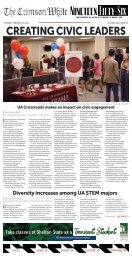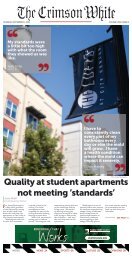Nineteen Fifty-Six Vol. 4 Issue 1
Nelson Mandela once said “Education is the most powerful weapon which you can use to change the world.” With the Fall 2023 Issue of Nineteen Fifty-Six, "Blackology" we wanted to highlight stories of Black Education from past, present and future. Focusing on the beautiful aspects of Black education but also he trials and hardships with it as well. Mostly we wanted to celebrate what it means to Black and Educated in an edition dedicated to Black educators, students and youth.
Nelson Mandela once said “Education is the most powerful weapon which you can use to change the world.” With the Fall 2023 Issue of Nineteen Fifty-Six, "Blackology" we wanted to highlight stories of Black Education from past, present and future. Focusing on the beautiful aspects of Black education but also he trials and hardships with it as well. Mostly we wanted to celebrate what it means to Black and Educated in an edition dedicated to Black educators, students and youth.
Create successful ePaper yourself
Turn your PDF publications into a flip-book with our unique Google optimized e-Paper software.
Is College<br />
Worth It?<br />
Kristen Taylor<br />
In an era where higher education is<br />
often glorified as the only pathway<br />
to success and opportunity, a<br />
pressing question arises for many<br />
aspiring students: Is college worth it?<br />
College can be an exciting time in a<br />
person’s life. It is a period where they<br />
can follow their passions and acquire<br />
knowledge and skills to navigate the<br />
challenges of adulthood. However,<br />
deciding to pursue higher education<br />
can be daunting. With rising tuition<br />
costs and the uncertainty of postgraduate<br />
job opportunities, due in part<br />
to increasing degree requirements<br />
and experience levels for entry-level<br />
positions, it is natural to wonder if<br />
college holds the same value and merit<br />
within the community.<br />
The question of whether college<br />
is worth it for Black students is a<br />
complex and multifaceted one. On<br />
the one hand, higher education can<br />
open doors for further professional<br />
and educational development, lead to<br />
higher-earning job opportunities and<br />
contribute to personal growth. On the<br />
other hand, it often comes with a hefty<br />
price tag and potential debt.<br />
In an interview Neil deGrasse Tyson,<br />
American astrophysicist and writer,<br />
said college isn’t about applying what<br />
you learn but knowing how to handle<br />
and confront problems you have never<br />
seen before.<br />
“You don’t go to college to learn a<br />
subject; you go to college to learn how<br />
to think, you go to college to learn<br />
how to do research,” Tyson said. “Then<br />
you come out a thinker and lifelong<br />
learner.”<br />
College is about more than just earning<br />
your degree. College provides a unique<br />
networking environment, often<br />
offering many resources, allowing<br />
personal growth and self-discovery.<br />
Regardless, it is important to<br />
acknowledge that Black students still<br />
face the harsh reality of how systemic<br />
racism can deter that growth.<br />
According to a United States<br />
Joint Economic Committee 2020<br />
report, “College-educated Black<br />
workers are also at a higher risk<br />
than their White counterparts of<br />
being underemployed—working in<br />
occupations that do not make use of<br />
their education and consequently pay<br />
less.”<br />
This disparity in employment<br />
opportunities can make the economic<br />
benefits of a college degree unclear for<br />
Black students.<br />
If college-educated Black workers are<br />
already getting paid less than their<br />
white counterparts, is the degree<br />
worth the cost?<br />
Especially when the cost of college<br />
education has been steadily rising.<br />
According to the Education Data<br />
Initiative, “Postsecondary institutions<br />
raise tuition (and fees) an average 6.8%<br />
each year.”<br />
These high tuition and fees often<br />
result in a considerable amount of<br />
student loan debt for many students,<br />
which can hinder financial stability<br />
even after graduation.<br />
Not to mention, the racial disparities<br />
59

















